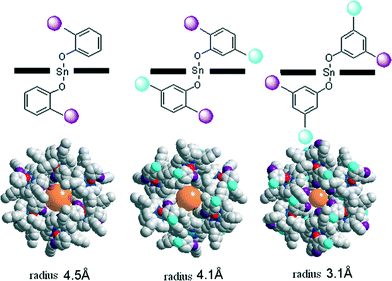In a recent paper, Langford et al report the formation of three new molecular porous materials with tunable channels. Tunability of the size and shape of the channels is important in the design of materials for gas sensing, guest exchange, catalysis and drug delivery. Other important factors such as thermal and solvent stabilities are also good.
The new compounds are readily prepared from tin(IV) porphyrin phenolates. Their structures feature a one-dimensional hourglass-shaped channel lined with methyl groups. The nature of the channel is readily varied by changing the methyl substitution of the phenolate component. In this way, the pore radius can be varied from 3.1 Å to 4.5 Å (see diagram below, showing the three compounds down the crystallographic c axis with channels shown as orange spheres and phenolic methyl groups lining the channel shown in purple).

The compounds are robust compared to other molecular porous materials, thought to be due to a combination of stabilisation by hydrogen bonding and stacking of the aromatic groups. In combination with the tunability, this suggests potential use for guest exchange or in small molecule capture applications and further investigation of this is ongoing.
For more information see the full paper at:
Supramolecular materials with robust and tunable channels constructed from tin(IV)porphyrin phenolates
Shuang Wang, Craig Forsyth and Steven J. Langford
CrystEngComm, 2015,17, 3060-3063
________________________________________________________________________________________________
 Gwenda Kyd has a PhD in metallocarborane chemistry from the University of Edinburgh. Other research work includes the spectroscopic study of the structure of glasses and organometallic electron-transfer reactions and the preparation of new inorganic phosphors. She has recently published a book on chemicals from plants.
Gwenda Kyd has a PhD in metallocarborane chemistry from the University of Edinburgh. Other research work includes the spectroscopic study of the structure of glasses and organometallic electron-transfer reactions and the preparation of new inorganic phosphors. She has recently published a book on chemicals from plants.










